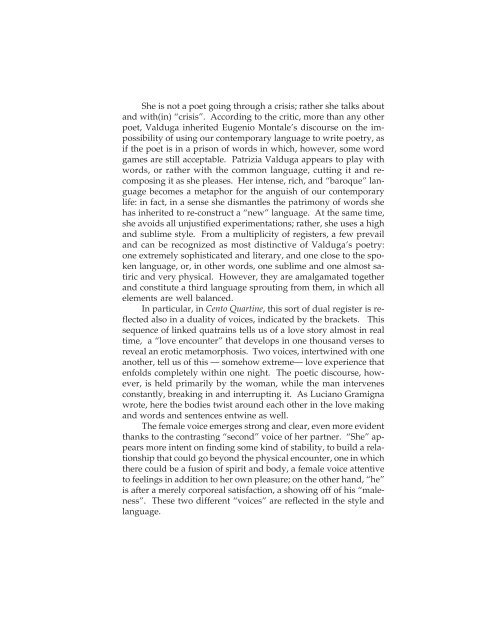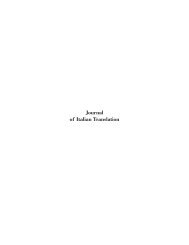Journal of Italian Translation - Brooklyn College - Academic Home ...
Journal of Italian Translation - Brooklyn College - Academic Home ...
Journal of Italian Translation - Brooklyn College - Academic Home ...
You also want an ePaper? Increase the reach of your titles
YUMPU automatically turns print PDFs into web optimized ePapers that Google loves.
Charles Jernigan - Irene Marchegiani / Patrizia Valduga<br />
She is not a poet going through a crisis; rather she talks about<br />
and with(in) “crisis”. According to the critic, more than any other<br />
poet, Valduga inherited Eugenio Montale’s discourse on the impossibility<br />
<strong>of</strong> using our contemporary language to write poetry, as<br />
if the poet is in a prison <strong>of</strong> words in which, however, some word<br />
games are still acceptable. Patrizia Valduga appears to play with<br />
words, or rather with the common language, cutting it and recomposing<br />
it as she pleases. Her intense, rich, and “baroque” language<br />
becomes a metaphor for the anguish <strong>of</strong> our contemporary<br />
life: in fact, in a sense she dismantles the patrimony <strong>of</strong> words she<br />
has inherited to re-construct a “new” language. At the same time,<br />
she avoids all unjustified experimentations; rather, she uses a high<br />
and sublime style. From a multiplicity <strong>of</strong> registers, a few prevail<br />
and can be recognized as most distinctive <strong>of</strong> Valduga’s poetry:<br />
one extremely sophisticated and literary, and one close to the spoken<br />
language, or, in other words, one sublime and one almost satiric<br />
and very physical. However, they are amalgamated together<br />
and constitute a third language sprouting from them, in which all<br />
elements are well balanced.<br />
In particular, in Cento Quartine, this sort <strong>of</strong> dual register is reflected<br />
also in a duality <strong>of</strong> voices, indicated by the brackets. This<br />
sequence <strong>of</strong> linked quatrains tells us <strong>of</strong> a love story almost in real<br />
time, a “love encounter” that develops in one thousand verses to<br />
reveal an erotic metamorphosis. Two voices, intertwined with one<br />
another, tell us <strong>of</strong> this — somehow extreme— love experience that<br />
enfolds completely within one night. The poetic discourse, however,<br />
is held primarily by the woman, while the man intervenes<br />
constantly, breaking in and interrupting it. As Luciano Gramigna<br />
wrote, here the bodies twist around each other in the love making<br />
and words and sentences entwine as well.<br />
The female voice emerges strong and clear, even more evident<br />
thanks to the contrasting “second” voice <strong>of</strong> her partner. “She” appears<br />
more intent on finding some kind <strong>of</strong> stability, to build a relationship<br />
that could go beyond the physical encounter, one in which<br />
there could be a fusion <strong>of</strong> spirit and body, a female voice attentive<br />
to feelings in addition to her own pleasure; on the other hand, “he”<br />
is after a merely corporeal satisfaction, a showing <strong>of</strong>f <strong>of</strong> his “maleness”.<br />
These two different “voices” are reflected in the style and<br />
language.<br />
61
















